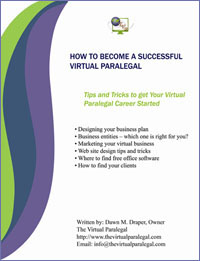The Virtual Paralegal Featured in Legal Assistant Today Magazine
Virtual Paralegal Trend Grows
Practitioners cite flexibility, the economy as benefits.
By Tammy R. Pettinato
Employees striking out on their own is a growing trend in many industries and the legal profession is no exception. Enter the virtual paralegal, who works independently, typically from a home office, providing many of the same services as a paralegal who is employed by a law firm or company, while, according to Dawn Draper, a virtual paralegal based in Traverse City, Mich., giving attorneys a cost-effective option to get the work done.
“I am seeing a growing trend in both the use of virtual paralegals in law firms and the desire for paralegals to work in a virtual setting,” said Draper, adding that using a virtual paralegal can save law firms money in terms of office equipment, supplies and paid benefits. Draper spent 12 years working as a paralegal, handling criminal law, family law and civil litigation at various law firms and a corporation before opening her business, The Virtual Paralegal, earlier this year. In addition to Michigan, she has clients in Virginia, Indiana and Texas.
“I definitely see an increase in people looking at virtual assistance as a career alternative,” said Lauren Hidden, marketing director-elect of the International Virtual Assistants Association and managing editor of IVAACast, the association’s publication. IVAA, which incorporated in 1999, currently has 1,048 members and has seen significant growth over the past two years. “With the increase in corporate and small business layoffs, more people are looking at being in charge of their own destiny,” Hidden said.
Laurie Mapp had been working as a paralegal for more than 10 years when she decided she needed a change. While she had enjoyed her previous work, first specializing in civil litigation with two firms in Alberta, and later working in the tax law section of the Canadian federal government, she had grown tired of office politics, not to mention her commute. She was searching for something with more flexibility and longed to own her own business. “I knew that working for myself would give me control and still provide challenges,” she said.
Thus, in September 2008, Halo Secretarial Services, Mapp’s virtual paralegal business, was born. Similar to a freelance paralegal, most virtual paralegals perform work under the supervision of an attorney, and Mapp said the only difference is geography. “A freelance paralegal might look for customers locally, while the virtual paralegal looks for clients online and locally,” Mapp said. “You can do pretty much any work that you can do in an office from home.”
For Mapp, who works from her home in Alberta, job duties include, “drafting documents, correspondence and memoranda; researching legal issues; managing the lawyer’s calendar; and liaising with clients.” And, although Mapp works from Canada, she deals extensively with U.S. attorneys. “I’ve actually found they are more receptive [to the virtual paralegal idea], so far, than Canadian attorneys,” she said.
Both Mapp and Draper cite increased flexibility and control over their work as benefits to working virtually. “I have the ability to create my work hours, take vacation time or other necessary family time off without having to request that time from an employer,” Draper said. “There is no such thing as a typical day, really,” added Mapp. “One day might see me drafting correspondence for one client and doing research for another, and the next day might see me popping out to help out at my son’s school. Some days I get a lot done early in the morning and the other days I do all of my work in the evening.”
And the pay is good. “I think a virtual paralegal earns a little more per hour than some [staff] paralegals,” said Draper, though she notes geography will affect salary levels. Adds Mapp, “You can make great pay if you work hard to get and keep your clients, provide them [with] exemplary service and show them what a fabulous resource you can be.”
There can be disadvantages. Mapp notes that working from home is less stable. “There is no job security when you are self-employed,” she said. “You have to build in time for marketing and networking or you won’t have business.” Virtual paralegals also can face security or conflict-of-interest concerns for clients. Both Mapp and Draper offer nondisclosure agreements and perform conflict-of-interest checks before accepting assignments.
Though there are some drawbacks, the benefits are likely to draw more paralegals into the virtual world. In fact, Hidden believes that the recent economic turmoil could actually be a boon for the industry. “I see business looking at money-saving alternatives and that often means outsourcing roles once held by employees,” she said. “I’ve also seen small and medium-sized businesses hire virtual assistants in order to focus on their marketing efforts in this economy.” Hidden believes that the role of virtual assistants will continue to grow. “The future is very bright for VAs,” she said.
Menu
- Home
- Experience
- Services
- Cost Comparison
- Articles
- Testimonials
- Contact
- Virtual Paralegal EBook
- Free Office Software
- Free Legal Forms and Legal Sources
Services Overview
- Legal document preparation (All jurisdictions)
- Legal research
- Deposition summarization
- PowerPoint presentations
- Draft correspondence
- Motions & responses
- Discovery
- E-File - CM/ECF
- Manage calendars and schedules
- Data entry services
- Digital transcription
- Transcription services
- Medical summaries
- Website Design/Logo/Blog services
- More Services
Testimonials
"Dawn has provided my solo practice with paralegal services for several years now. Her paralegal expertise is a great asset to my business." John M. LaCross
Virtual Paralegal EBook
Want to learn how to become a successful virtual paralegal? Check out our EBook.Contact Us
For more information on the services that The Virtual Paralegal can provide your business, please contact us for a free consultation.
TEL:231-680-0081
FAX: 360-343-9551
E-mail:thevirtualparalegal@gmail.com
© Copyright The Virtual Paralegal
Web Design by Dawn M. Draper



